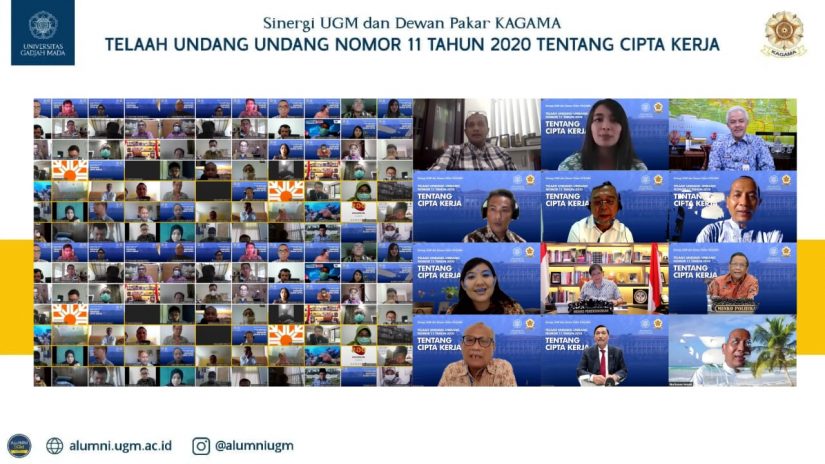
The Job Creation Law has lately been a hot topic. Various communities, organizations, institutions, and educational institutions have started to chime in on the policy, and Universitas Gadjah Mada was no exception. Therefore, the university held the Sinergy of UGM and the KAGAMA Expert Council webinar entitled “Review of Law No. 11/2020 on Job Creation” through the Zoom conference on Tuesday (17/11).
The Rector, Prof. Ir. Panut Mulyono, M.Eng., D.Eng., IPU., ASEAN Eng., remarked that the community was currently facing declining economic capacity due to the pandemic. Furthermore, the pandemic had also increased the number of unemployed due to layoffs and laid-off workers. In addition, up to this point, the licensing process for conducting micro-enterprises is still very convoluted, which hinders the development of MSMEs. Therefore, this academic discussion seeks to provide suggestions or solutions to various problems currently facing this country.
“As a revolutionary campus and the university of the people, UGM has a high commitment to contribute to solving different problems faced by the community, nation, and state, including through discussions of the Job Creation Law,” said the UGM Rector.
Prof. Dr. Mahfud MD., SH, SU, MIP, Coordinating Political, Legal and Security Affairs Minister, said that the emergence of Job Creation Law could help boost investment opportunities, both from within and outside the country, which had been long deterred by convoluted bureaucracy and related laws and regulations.
“The Job Creation Law has been finalized and ratified; therefore, it is binding. However, the content still stirs many controversies—some agree, some don’t,” he said.
Mahfud MD admitted that the law still necessitates numerous improvements; hence the government is proposing three methods. The first is a judicial review submitted to the Constitutional Court, which has been previously completed. Second, suppose substantive issues did not pass the judicial review due to its nature as a legal, political choice. In that case, they can be submitted to legislative review. According to Mahfud, this forum can help initiate the process. Meanwhile, the third option is for the government to establish a special force to accommodate public opinion. Then, the remaining problems can be included in the derivative laws that follow.
According to Coordinating Economic Minister, Airlangga Hartarto, the Job Creation Law is expected to encourage new job opportunities through increased investment and worker protection in Indonesia.
“Looking at the current situation, every year there are 6.9 million people in need of employment, 3.5 million workers who are laid off, and 3 million young people struggling as new workforces— it is necessary to create jobs,” he concluded.
The Job Creation Law is anticipated to resolve this problem by encouraging productivity to become a competitive advantage or economic leverage.
Prof. Dr. Tadjuddin Noer Effendi, M.A., saw that the Job Creation Act was formed to create an investment-friendly ecosystem, as clearly stated in Article 7. However, he believed that the law is already long overdue when examined from the perspective of development and employment studies.
“[It] should have been done 20 years ago when there was an extraordinary change in demographics, a sharp increase in the number of workers, and a growing flow of labor from agriculture to non-agriculture sectors,” declared the Professor of the Faculty of Social and Political Sciences.
Economic transformation will theoretically go hand in hand with the workforce shift from the agricultural sector to the industrial sector. It is because every transformation process will generate social changes in the work culture, as well as job security and retirement insurance. In Indonesia, however, the shift of labor is not from the agricultural sector to industry, but the transformation happened from the agricultural sector to the informal sector. As many as 60% of the workforce is in the informal sector and 40% in the formal sector. Meanwhile, the informal sector is dominated by low-income jobs.
“The disrupted transformation from the formal sector to the industrial sector creates unemployment, and this has caused our unemployment rate to skyrocket in the last 20 years,” he explained.
The Governor of Central Java and General Chairperson of PP KAGAMA, Ganjar Pranowo, said that we need to highlight several problems, such as the difficulty of workers and companies finding agreements regarding outsourcing, overtime, wages, and layoffs protocols. In addition, it is necessary to add regulations to increase productivity and determine the wage structure at the enterprise level.
Law No. 11/2020 on Job Creation still contains several weaknesses. Still, constructive criticism should be appreciated considering that the emergence of this regulation cannot be separated from efforts to improve the system from a fairly chronic past. Many improvements have been suggested by experts to improve the regulation and to find solutions to labor problems in Indonesia.
[Alumni relations/article:Winona,Photo:Dave]
